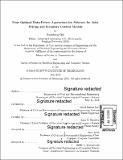Near-optimal data-driven approximation schemes for joint pricing and inventory control models
Author(s)
Qin, Hanzhang(Scientist in civil and environmental engineering)Massachusetts Institute of Technology
DownloadFull printable version (4.139Mb)
Other Contributors
Massachusetts Institute of Technology. Department of Electrical Engineering and Computer Science.
Advisor
David Simchi-Levi.
Terms of use
Metadata
Show full item recordAbstract
The thesis studies the classical multi-period joint pricing and inventory control problem in a data-driven setting. In the problem, a retailer makes periodic decisions of the prices and inventory levels of an item that the retailer wishes to sell. The objective is to match the inventory level with a random demand that depends on the price in each period, while maximizing the expected profit over finite horizon. In reality, the demand functions or the distribution of the random noise are usually unavailable, whereas past demand data are relatively easy to collect. A novel data-driven nonparametric algorithm is proposed, which uses the past demand data to solve the joint pricing and inventory control problem, without assuming the parameters of the demand functions and the noise distributions are known. Explicit sample complexity bounds are given, on the number of data samples needed to guarantee a near-optimal profit. A simulation study suggests that the algorithm is efficient in practice.
Description
Thesis: S.M. in Transportation, Massachusetts Institute of Technology, Department of Civil and Environmental Engineering, 2018. Thesis: S.M., Massachusetts Institute of Technology, Department of Electrical Engineering and Computer Science, 2018. Cataloged from PDF version of thesis. Includes bibliographical references (pages 95-96).
Date issued
2018Department
Massachusetts Institute of Technology. Department of Civil and Environmental Engineering; Massachusetts Institute of Technology. Department of Electrical Engineering and Computer SciencePublisher
Massachusetts Institute of Technology
Keywords
Civil and Environmental Engineering., Electrical Engineering and Computer Science.